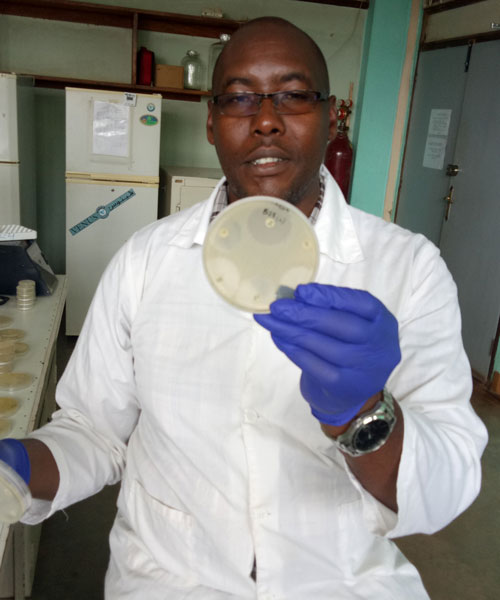
Bacteria and their inner viruses, or phages, have evolved together, helping each other in many ways. Phages bring the ability to cope with dangers, and in exchange bacteria offer a shelter against the outer world. At times, however, phages can be the enemy within: when they need to replicate themselves, they kill their bacterial host.
Many scientists are exploring this peculiar property to fight bacterial infections that are resistant to common drugs and pose a heavy burden on global health. Among them is Kenyan microbiologist Atunga Nyachieo, the recipient of the first grant offered by the TWAS Young Affiliates Network (TYAN).
"Phages live in bacteria, and do not affect humans and animals," explained Nyachieo, currently chief of research at the renowned Institute of Primate Research, a World Health Organization (WHO) collaborating centre based in Nairobi, Kenya. "To complete their life cycle, they hijack the bacterial machinery, punch a hole in the cell wall and swarm outside. So we reasoned: why not use phages to target bacteria that are resistant to common antibiotics, and are hard to eliminate from the human body?"
As a 2014 TWAS Young Affiliate, Nyachieo belongs to those promising early-career scientists that the Academy has been selecting since 2007 for their strong work and future potential. Each year, the five TWAS Regional Partners each select up to five excellent scientists to become Young Affiliates, serving five-year terms. When their terms end, they become TWAS Young Alumni.
Nyachieo is also a member of TYAN, which aims to encourage collaboration among young scientists within the TWAS family. The idea for TYAN was first conceived by Yin Li, the director of the CAS-TWAS Centre of Excellence for Biotechnology in Beijing.
Li's idea was to make TYAN a group bringing fresh perspectives to the Academy. Thanks to his efforts and the collaboration offered by many Young Affiliates, TYAN was officially launched in 2016 during the Academy's 27th General Meeting in Kigali, Rwanda, with the strong support of then-TWAS President Bai Chunli and then-Executive Director Mohamed Hassan, and with the financial support of Lenovo, the global computing leader.
Nyachieo works on antibiotic resistance, the ability of some bacteria to resist the effect of antibiotics that are administered both to patients in hospitals and to cattle through food, as a preventative measure against infections. And he is exploring the use of phages to kill resistant microbes.
To develop new skills in his field, he won one of the first TYAN Collaborative Grant Awards, a short-term grant worth USD3,000 that's available to TYAN members. The grant gave him the opportunity to travel abroad and acquire new experience in isolating, growing and using phages for therapeutic purposes.
According to recent estimates, by 2050 as many as 10 million people worldwide could die of antimicrobial resistance. Of these, 80% could be in developing countries. "With these figures in mind, I decided that I should try to help find a solution to this problem. Bacterial phages can be used as a boomerang, to kill resistant bacteria from inside," Nyacheio explained in an interview at 28th TWAS General Meeting in Trieste, Italy.
He found a collaborative laboratory at the University of Makerere in Uganda, led by respected microbiologist Jesca Nakavuma, who is based at the College of Veterinary Medicine. There, through the TYAN grant, Nyachieo spent a full-immersion two-week period learning new techniques on phage cultivation and manipulation.
"I got the grant in April 2018 and moved to Uganda in September," he said. "I learned phage-specific assays and studied the main properties of phages that are specific for bacteria like E. coli and Salmonella, two strains that pose a big challenge due to their ability to resist to common antibiotics."
Two weeks may seem too short to get results – but they are not. "With as little as 15 days to complete a project, grant winners remain focused on their task and are result-oriented," explained Sok Ching Cheong, a TYAN co-chair and a group leader at Cancer Research Malaysia in Selangor, Malaysia.
To clarify the rationale behind the grants, which were established early in 2018, she added that the idea to offer the grants "is in line with our mission and vision: stimulating global collaboration among young scientists, offering the chance to move, visit foreign labs and learn new skills." The grants are awarded to TYAN members on the basis of scientific merit; at the end of the collaboration, grantees must submit two reports, proving their commitment and results.
And there is an added value: scientists establish partnerships with local and foreign scholars, and collect data for their scientific publications. Nyachieo, in fact, expects to publish a paper soon on the work he did with the grant.
He also met some of Nakavuma's partners, and they are now part of his enlarged international network: Elizabeth Kutter of Evergreen State College (USA); Martha Clokie from the University of Leicester (U.K.); and Tobi Nagel, the president and founder of U.S.-based Phages for Global Health.
Upon returning to his home lab in Kenya, Nyachieo started the purification and genetic characterization of his potential therapeutic phages, an important step before he decides to use them for human therapy.
"This exciting experience has left me with many gifts," he said. "Working full-immersion with no administrative or social distractions helped me to make important progress, useful to my career. On the human side, short as it was, the integration with Ugandan people and culture has enriched me."
Cristina Serra

